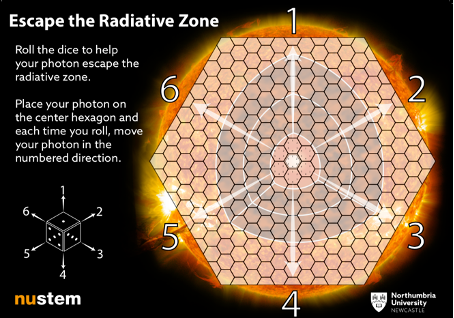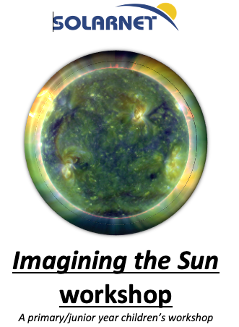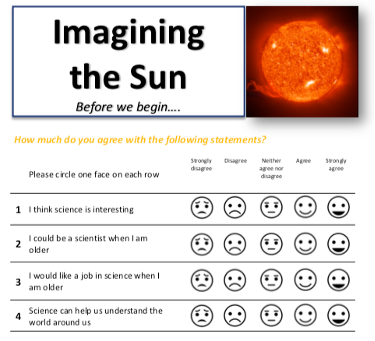The following are some free resources to help you plan and deliver public engagement activities.
The ‘Imagining the Sun’ workshop files are currently written in english only, but we are looking to also provide translations. If you use the resources and translate them, we would be grateful for a copy to share with the community.
We also provide lecture content from the 1st SOLARNET Public Engagement Workshop and SOLARNET Science Communication training sessions. We hope this is useful starting point for thinking about how you can best undertake public engagement and science communication activities.
If you would like any further information about the resources, you can contact Richard Morton (Northumbria University).
If you use any of the materials, please cite the ‘Resources courtesy of the SOLARNET project, which has received funding from the European Union’s Horizon 2020 research and innovation programme under grant agreement No 824135.’
Imagining the Sun – a schools workshop
The Imagining the Sun workshop is a short (1 hour) workshop that is designed for working with and engaging children. The workshop introduces the children to some basic concepts on the Sun and space, as well aiding in the development of their ability to work and think scientifically. It has been designed to take place in a school environment, but can be used elsewhere. A version of the workshop has been delivered numerous times as part of outreach projects at Northumbria University (UK), by both solar physicists and science communicators.
There are a number of different materials that are related to the workshop:
- A manual/guide to running the Imagining the Sun workshop (Imagining_the_Sun_workshop_manual.pdf)
- Imagining the Sun presentation (Imagining_the_Sun.pptx)
- Print-out of Slide 2 (Hand_Out_1_ItS.pdf).
- Print-out of Slide 9 (Hand_Out_2_ItS.pdf).
- Escape the Sun game materials (see the related Escape the Sun resources).
Details of the resources are given in the manual.
Example of Outreach Evaluation
Evaluation is an important part of any project. For public engagement activities that hope to make some impact on their audiences, it is a very useful tool. Engaging with evaluation and using it with your public engagement will enable you gauge how well your activities are doing, examine whether you are achieving the outcomes and impact you want, and provide an opportunity to reflect critically on what you are doing. Here we provide an example of outcome/impact evaluation that has been used with the Imagining the Sun workshop. We also provide a brief guide to Evaluation, pointing towards resources and also the motivation and decision making behind the example Evaluation. In the future, we will provide an example analysis of workshop survey results.
- A brief overview on aspects of evaluating public engagement activities, as well as describing the details of the provided surveys and how they should be used (Evaluation_of_Imagining_the_Sun_workshop.pdf)
- Examples of surveys that can be used with the Imagining the Sun workshop (ItS_Workshop_surveys.pdf).
- An editable version of the pre-workshop survey (Pre_workshop_survey.pptx).
- An editable version of the post-workshop survey (Post_workshop_survey.pptx).

`Escape the Sun’ board game
A board game based on the random movement of photons in the Sun’s interior, giving the player an idea about how energy is transported by radiation. This can be used as a classroom activity with the Imagining the Sun workshop or as a standalone activity. Details are given in the documentation on how to play the Escape the Sun game, and gives some basic facts about the underlying science. The science is given as a guide to the possible discussion that could be had around the game. The depth of the content can of course be tailored to the audience.
- A guide to playing Escape the Sun with an overview of the science and materials required (Escape the Sun.pdf).
- A visual description of how to play the Escape the Sun game (Escape_the_Sun_movements.pdf).
- The game board (Escape_the_sun_game_board.pdf).
SOLARNET Public Engagement and Science Communication Training
Introduction to Science Communication
The aim of this workshop is to introduce various aspects of Science Communication. It looks at the breadth of different science communication activities and the different audiences you might encounter. Each audience may have a different level of scientific understanding, and also have different motivations for engaging with activities. The workshop contains some hands-on activities that challenge the participant (reader) to think about how best to simply and explain research concepts and describe your research for a non-specialist audience. Slide from workshop (SOLARNET Sci Comm Training pptx).
Unconscious bias
This aspect of training is from a session held at the Public Engagement workshop. It is a session which examines potential unconscious bias within outreach activities, challenging you to think about how you can adapt your activities to counter any bias. Slides from unconscious bias session (UB SOLARNET pptx).
Design for evaluation and pathways to impact
This training is from a session held at the Public Engagement workshop. It focuses on how to design evaluation for outreach activities. There are many reasons to undertake evaluation of your outreach. It makes planning better, enables critical reflection (Has this worked as you hoped? Could this be done better?), and enables evidence of impact. Slides from evaluation session (SOLARNET Evaluation pptx).
The linked pdf and powerpoint files on this page are licensed under a Creative Commons Attribution 4.0 International License. This does not necessarily apply to other content on the SOLARNET webpages.


